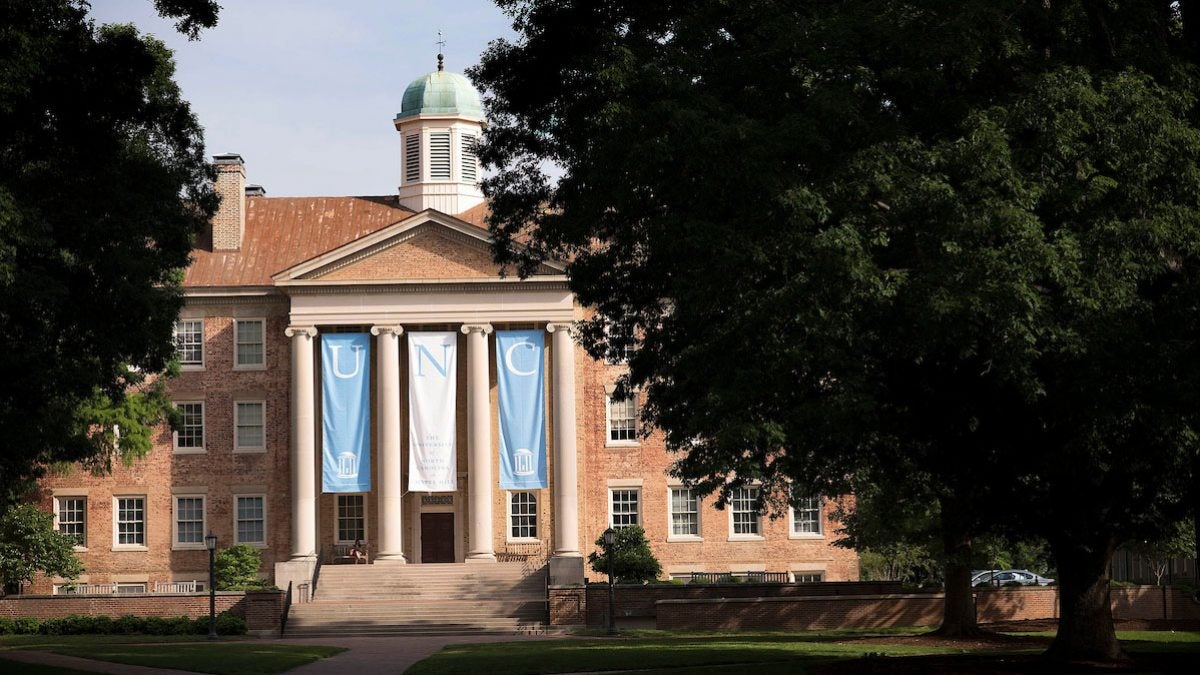Priority order
Executive Vice Chancellor and Provost Bob Blouin is partnering with colleagues across campus to change some aspects of the University while holding on to the creative and collaborative culture and the grand mission that makes Carolina special.

Executive Vice Chancellor and Provost Bob Blouin held up two legal pads, their top pages neatly divided into three columns and filled with his tiny printed lettering.
“These are the University’s priorities,” he explained with a laugh. “Someone said, ‘You write so small!’ But I have a rule. My to-do list has to fit on one sheet of paper.”
The items on Blouin’s to-do list are embedded in The Blueprint for Next, the University’s strategic framework launched by Chancellor Carol L. Folt last year. The Blueprint will guide Carolina during the next 10 years.
“Bob’s demonstrated commitment to planning, execution and assessment, combined with his penchant for cross-cutting collaboration, is just what Carolina needs to create momentum behind the implementation of our strategic framework,” Folt said. “With his focus on helping students prepare for the future and providing our faculty the support they need to teach and ignite the passions of this new generation of leaders, we are seizing opportunities and investing in new ideas.”
Folt talked about the priorities she developed when she came to Carolina in 2013. “One of my key areas of concentration was to build a high-performing, collaborative cabinet committed to guiding the daily work of our University while we also created our path into the future,” Folt said recently. “Bob is an accomplished leader who shares this vision for Carolina.”
Blouin welcomes the responsibility to serve with Folt because he feels research, education, engagement and operations are interdependent. He bases that view on his 14 years of experience as dean of the UNC Eshelman School of Pharmacy, where “before we could really dream the big dreams, we had to make sure that we could do the basic things well,” he said.
The same principle applies to the University as a whole. “The biggest frustrations with many universities are that they’re not efficient. It takes too long to do this or it’s too cumbersome to do that,” Blouin said. “In order for us to continue to be a world-class university, we’re going to have to make sure that we’re operating in the most efficient ways. Otherwise, it will be hard for us to achieve our aspirational goals.”
The right balance
The key to achieving these efficiencies is establishing the right balance between centralization and decentralization. That’s why Blouin hit the pause button on a couple of business-side initiatives — a new budget model and Carolina Service — until the right balance can be struck.
The solution won’t be one size fits all, but something tailored to the specific culture here at Carolina, particularly as expressed in the strategic framework’s pillars “of the public, for the public” and “innovation made fundamental.”
“Innovation made fundamental means everything we think about, from changing the way we do business operations at this University all the way to how we educate this generation of learners to addressing some of the most challenging opportunities and problems in science and medicine. It all requires a mindset of innovation made fundamental,” he said.
Dhiren Thakker, the 20-year veteran researcher and educator selected by Blouin to serve as interim pharmacy dean, was one of Blouin’s closest advisers during his tenure as dean. “Bob Blouin integrated entrepreneurship and innovation into every aspect of the pharmacy school, so I am confident that he will implement ‘innovation is fundamental’ across the entire campus,” Thakker said.
Since Blouin joined Folt’s cabinet, the two have visited schools and units on campus to hear their particular insights and perspectives. Both appreciate the opportunity for these interactions with faculty, staff and leadership.
In the past, the University operated in a largely decentralized way, with a rich history of strong schools and academic units that have enhanced its academic reputation, Blouin said.
“As we approach the year 2020, the operation of the University is very different today than it was 20 years ago. We have to modernize all aspects of our environment to support the mission of the schools and University so they can be successful in the future,” Folt said.
“We have to take better advantage of big data — data analytics, predictive analytics — in order to accelerate and support the work of our faculty, staff and students,” Blouin said. “We’ll be calling on people from across the campus who have expertise and interest in these issues in order to improve and optimize the way this University operates.”
Improving the budget model
To improve its process for resource management, planning and allocation, Carolina will need to adopt a new budget model. The one currently being discussed is a responsibility-centered management model, also called an incentive-based model.
This model emphasizes greater collaboration between deans and department heads with the overall budget planning process at the University. The budgeting process will reflect Carolina’s strengths, innovative culture and core values while building new processes and tools to ensure sustainability and long-term integrity.
“There are many questions that needed to be answered. We’re in the middle of that due diligence process, looking at advantages as well as unintended consequences,” Blouin said. A modified version will be brought to the units to be discussed by faculty and staff leadership teams in the coming months.
The way we work
Once the budget model is set, a “similar approach will be utilized to approach the modernization and acceleration of university business and operations or the way we do work,” Blouin said. This initiative will evaluate how services are delivered for the key business and administrative activities of finance, human resources, IT, communications and research administration.
As with the budget model, the goal Folt set for the modernization of University business and operations is to achieve efficiency without sacrificing a bit of Carolina’s outstanding collaborative tradition or the aspirations expressed in The Blueprint for Next.
“These are not just things we want to do on a checklist, that we accomplished this or accomplished that,” Blouin said of The Blueprint for Next. “We want to transform education and research at this University. And we want to make sure that we learn from each other regardless of what school or department you call home.”
Both Folt and Blouin are particularly excited about the Creativity Hubs initiative launched by Terry Magnuson, vice chancellor for research. “This has actually brought together some really talented faculty who hadn’t thought so much about working in collaboration with one another—individuals pursuing common themes from very different scientific perspectives,” Blouin said.
Together with the chancellor, the provost has the responsibility to create and maintain that same kind of work environment across the whole University, a place where talented individuals working in collaboration achieve great things in the most efficient, effective way.
“This is a great University largely because it has incredibly talented faculty, staff and students,” Blouin said. “The Blueprint for Next will capitalize on this outstanding talent by creating unique opportunities for people to reach their full potential across the mission of the University. To fulfill this aspirational goal, we must create an environment that supports innovation and creativity in all that we do and do it at a high level of efficiency and excellence.”
That’s what all the items on Blouin’s long to-do list add up to — partnering with Folt and their colleagues across Carolina to change some aspects of the University while holding on to the creative and collaborative culture and the grand mission that makes Carolina special.




